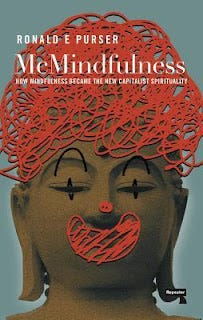We're Ruining Mindfulness with How We Do It: Ronald Purser's McMindfulness - A Short Review
We have a mindfulness problem. But it isn't the one you would think of, or that popular culture and media would have you think of. We have the most ironic of mindfulness problems. We think we know what it means to be mindful: to be aware, to be present, to be in the moment. We've listened to countless soothing voices remind us to bring our attention back to our breath. But for what, exactly?
I certainly don't take the position that mindfulness serves no purpose or that it doesn't have any benefits. But I do agree with Ronald Purser's main claim, that mindfulness is supposed to be rooted in something larger than ourselves. I think that having clarity and focus is important but why should we seek to be clear and focused? Purser shows how mainstream mindfulness has incorporated the Puritan work ethic to its detriment. That work ethic tells us that we can achieve anything if we work hard enough but when we apply that to mindfulness, we drive ourselves to be mindful only of ourselves. We learn that controlling ourselves is all we need to do. But that, says Purser, is not what mindfulness is.
The author makes many incisive observations about how McMindfulness has neutered what mindfulness is meant to be and about how mindfulness has become a tool of corporate interests. And while I agree with his arguments, I can't provide more or better insight about those areas. What I want to share are my thoughts on how McMindfulness has influenced how we function as coaches and how we interact with others, especially athletes in our care. As coaches are wont to do, we have taken a complex framework and turned it into a drill that we do in practice. We have flattened the contours and nuances of mindfulness into a thing that we can plug into our practice plans rather than keep the complexity and have it change how we view coaching.
To be clear, I think that a simplified version of mindfulness is beneficial in sports and performance. While my interest in ecological dynamics and related theories of skill acquisition may lead to differing opinions of what we should be mindful of, I still think that coaches and athletes alike can free themselves to perform better by applying ideas of mindfulness. The issue is that mindfulness means so much more and I can't turn away from that. It is meant to have us better understand our place in the world, not just our place on the court. It is meant to position us to do something about the conditions we see in the world. When we use self-awareness mindfulness techniques divorced from their roots in social and community awareness, we miss the point of mindfulness. We use these techniques to slow our thoughts but we do so to make space for small actions like jumping higher and moving quicker or "better". Purser is reminding us that the purpose of stillness of mind is to give us more clarity on what exists around us and how we are perceiving and interacting with everything outside of us but we can only do that by first making space within us. We can then use that space to be part of big actions too.
So are we using mindfulness in teams to help us do something to something like a ball? Or are we using it to do something with those around us? Are we using it to be better athletes or better teammates and better humans? I don't think we should just do a minute of focused breathing so that we are better at ignoring external "distractions". I think we should use the breath as a way to see our team and our place in it more clearly. I won't mistake a feeling of stillness for a feeling of peace. To me, the peace comes not from a quiet mind but from right living. The breathing gives me a chance to reflect on how I am living. I can see if I am working together with my teammates in meaningful and positive ways. Part of that reflection may be that I need to do my job better but I think that should come after the reflection on how I am integrating with my team. If I can't or won't be mindful of my part in the larger whole then I am putting my ego before all else, which is antithetical to a mindfulness practice.
I also think that using mindfulness practice is an opportunity to create awareness of things that exist outside of our teams as well. I think that we should be asking ourselves how our coaching and playing sports makes an impact on the larger community and the world. How can we use who we are and what we do to be meaningful parts of our community? If creating stillness and peace within ourselves and our teams means that we must do work outside of sport then I think we have taken Purser's words to heart. I am not saying that sport should be only an avenue to social justice but I do want to say that mindfulness in the Buddhist tradition means that all of these lie along the same path.
I have been thinking lately about the communities in which we practice: our teams, our opponents, our spectators, our histories, our futures, and ourselves. I have been wondering what it is that we are creating, recreating, reproducing, passing on, and adding to. When we say we want athletes in our care to grow and develop, what do we want them to grow and develop towards? How do our daily choices and actions contribute to that? How can mindfulness be part of that vision? Let us meditate on that.


